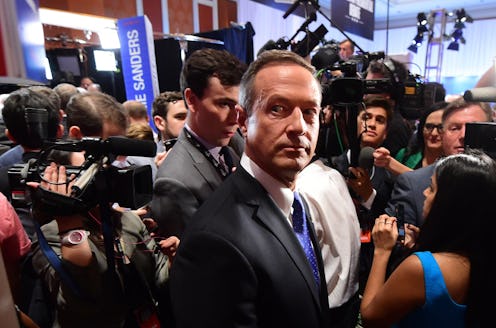Democratic candidate and former Governor of Maryland Martin O’Malley is inherently the underdog when pitted against big names — Hillary Clinton and Bernie Sanders — but if moderators allow him more time to distinguish himself from the favorites, this second Democratic debate may be his chance to pull ahead. According to The New York Times, both Clinton and Sanders were given at least ten more minutes of speaking time than O’Malley, who spoke for a total of about 18 minutes in the first round debate.
Though he’s low-profile right now, O’Malley, like Sanders and Clinton, has experience in government but is younger than both, giving him a potential advantage in appealing to the millennial crowd. Here are some reasons why the former governor of Maryland should be given the chance to familiarize the public with his viewpoints.
His Stance Against Gun Violence Is Tougher than Sanders’
In the first round of debates, O’Malley, after jumping into the discussion, garnered thunderous applause for his response to whether people who manufacture and sell guns should be held responsible when those guns or ammunition get into the wrong hands. He brought up the Aurora, Colorado theater shooting, stating that a man sold 4,000 rounds to the shooter without asking questions.
They [seller] were slapped with $200,000 in court fees because of the way the NRA gets its way in our Congress and we take a back seat. It's time to stand up and pass comprehensive gun safety legislation as a nation.
There are some issues — though not many — where little gray area exists, and gun control is one of them. O’Malley’s stark stance on the issue is tougher and more progressive than that of Sanders, who has been more lax on the topic. When asked whether gun manufacturers should be held responsible during a CNN interview conducted in July, Sanders compared guns to hammers.
Do you hold a gun manufacturer responsible? Not any more than you would hold a hammer company responsible if someone beats somebody over the head with a hammer.
But you can’t load a hammer with bullets. America’s epidemic of gun violence is a high-profile issue, and O’Malley is willing to take more action than his opponent. Now, he just needs some screen time to show it.
He Can Appeal to Millennials
O’Malley addressed some important issues during the first debate, but was cut off before he had the opportunity to explain his commitment to ameliorating problems that are important to millennials, in particular. Anderson Cooper asked the former Maryland governor whether he believes the Democratic party is still being “defined by Hillary Clinton’s email scandal,” a futile question based on his opponent, rather than on his own policy views.
In his answer, however, he managed to list some issues he would like to focus on instead such as “making college debt-free” and making America "100 percent clean electric by 2050.” Mention of such issues marked O’Malley’s most animated moment as the enthusiasm shone through his face. Unfortunately, he was cut off from speaking before he could specify. The second round of debates is his last chance.
He Takes a Humanitarian Approach to Social Rights Issues
O’Malley’s extensive voting record — he was elected governor of Maryland for two terms — shows his dedication to social rights for immigrants, the LGBT community, and prisoners. For example, he signed the DREAM act, which extends in-state tuition to a number of undocumented immigrants, into law in 2011 and voters agreed to uphold it in 2012, CNN reports. In 2012, he signed a bill to legalize same-sex marriage in Maryland, which became the eighth state to do so in 2013. Then came his 2013 repeal of the death penalty, making Maryland the eighteenth state to outlaw it.
In each scenario, O’Malley chose to view these issues from a humanitarian perspective and has done so for a number of years. Regardless of whether Americans agree with each of these positions, they need be aware of the commitment behind them.
He Listens to Both Sides
Unfortunately, politicians are criticized for changing their minds and commended for stubbornly holding onto their own personal ideals, even if they are outdated. Such tendencies encourage politicians to discount other ways of thought and opposing points of view — just look at the vicious divide between the Democratic and Republican parties. Maintaining strength in one’s beliefs is a sign of confidence, but an evolving opinion, based upon intelligence and a willingness to listen, should be viewed as equally admirable. Take for instance, O’Malley’s stance on marijuana legalization.
As mayor of Baltimore, O’Malley said he witnessed the damage caused by drug addiction and viewed marijuana as a gateway drug. Sticking with his belief that marijuana should not be totally legalized, he was willing to admit its medicinal benefits and decriminalized possession in small quantities in 2014. The point here is not legalizing marijuana — it’s O’Malley’s demonstrated flexibility and attention to detail and opposing opinions. In a nation comprised of different races, viewpoints, and experiences, this trait is pertinent to leadership.
